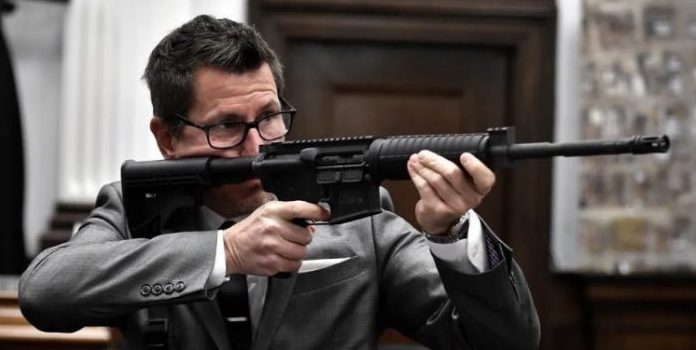(Headline USA) In closing statements Monday prior to jury deliberations, prosecutor Thomas Binger reportedly pointed an AR-15 directly at the jury with his finger on the trigger.
Look at this goofball with his finger on the trigger pointed at a courtroom full of people. pic.twitter.com/th5eARTaPT
— Shane B. Murphy (@shanermurph) November 15, 2021
Binger—who said his assistant had checked the weapon in advance—evoked for some flashbacks to the tragic shooting recently involving actor Alec Baldwin, presumed to have been a misfire on the New Mexico set of the movie Rust.
The purpose may have been to elicit in jurors the same fight-or-flight response that three violent Antifa rioters who attacked Rittenhouse may have felt before being shot by him.
But it also underscored the reckless approach with which he has proceeded throughout the case, charging forward without fully considering the implications of his theatrics.
Despite the dangerous spectacle, mainstream media characteristically laid cover for him, with Associated Press analyst Michael Tarm asserting, for example, that “The lead prosecutor struck a measured tone, even as he raised the accused’s rifle at one point and sighted at a courtroom wall.”
Tarm’s op-ed neglected to mention that the jury happened to be in between the prosecutor and the wall.
Meanwhile, defense attorney Mark Richards invoked Jacob Blake, the knife-wielding domestic abuser whose police shooting triggered the race riots, as he argued to jurors that Rittenhouse had the right to self-defense when he shot Joseph Rosenbaum and two other men in August 2020.
“Other people in this community have shot people seven times and it’s been found to be OK,” Richards said. “And my client did it four times in three-quarters of a second to protect his life from Mr. Rosenbaum.”
The remark was a reference to a white police officer, Rusten Sheskey, shooting Blake on Aug. 23 as police were responding a domestic disturbance. Blake, who was shot in the back, was left paralyzed. Kenosha County District Attorney Michael Graveley declined to charge Sheskey, saying evidence showed Blake had a knife and was turning toward the officer.
Judge Bruce Schroeder, reportedly under police protection after receiving hundreds of threats, also came under another media attack for editing the jury instructions in the middle of delivering them.
Schroeder, under intense pressure to prevent a hung-jury mistrial, paused about 30 minutes into his delivery.
“I’ve got myself into a mid-sentence, and I don’t like it,” he said.
Then he turned off his microphone and called attorneys to the front of the courtroom.
“I’ve worked with the instructions all weekend and we discussed them by email and then I’m reading them and little things are striking me as I read them,” he said after jurors left the room.
Phyllis Cotey, a clinical professor at Florida International University’s College of Law and a retired judge, said carefully scrutinizing and revising jury instructions and even stopping mid-instruction to correct a potential error are wise steps to try and give jurors a clear understanding of the law.
Cotey declined to comment specifically on Schroeder’s approach, saying judicial ethics prevent her from commenting on a pending case or another judge.
Judges often begin reading instructions aloud and spot typos or errors, she said.
“You don’t want to just change it without having another side weigh in,” she said. “That again becomes a basis for appeal. The best thing to do then is to stop and talk it out.”
Cotey said adding explanation beyond a court’s model or pattern instructions can be a risk.
“There are standard instructions for a reason, and jury instructions can be the basis for an appeal if they’re not proper,” she said.
The longtime judge’s legal decisions and quirky mannerisms have been closely scrutinized during Rittenhouse’s trial.
Schroeder entertained potential jurors with trivia during jury selection and shouted at the lead prosecutor when felt his cross-examination of Rittenhouse crossed legal boundaries. Some legal observers faulted the judge for leading a round of applause on Veterans Day despite knowing a defense witness was the only self-identified veteran in the room.
He has repeatedly joked about his lack of technical expertise and drew more attention last week when sending jurors to lunch remarked that he hoped “the Asian food isn’t coming, it isn’t on one of those boats in Long Beach Harbor.” Observers seized on the remark, an apparent reference to a cargo ship backlog seen on the West Coast, as questionable at best and racist at worst.
Schroeder has seemed to be aware of the scrutiny. He quipped Monday about wishing fewer people had his email address. And in discussing the day’s schedule with attorneys, he said:
“And I’m not going to comment on lunch.”
Adapted from reporting by the Associated Press

